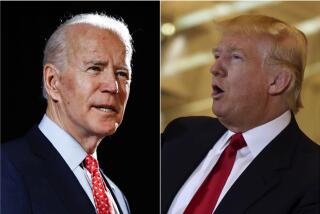Political Parties’ Use of Issue Ads
- Share via
Re “The Greed of Both Parties Undermines the Election Law,” Opinion, Nov. 2: Philip Heymann ignores 20 years of decisions by the Federal Election Commission, and misunderstands the unique treatment of political parties under the law. The law does not require separation between a party and its candidates. Indeed, in 1996, in a brief before the Supreme Court, the FEC stated that “coordination [of party expenditures] with candidates is presumed.”
In making his charges, Heymann fails to cite the advisory opinions issued by the FEC directly on this question, upon which the Justice Department relied in explaining the department’s position that allegations of presidential candidate involvement in party issue advertising did not warrant the appointment of an independent counsel.
The FEC has specifically declared issue ads to be legal. These rulings have the force of law, and the attorney general is bound by them. The FEC has ruled that so long as party issue ads do not contain “electioneering messages” (e.g., explicit references to an election, identification of an individual as a candidate or other explicit exhortation), they are not considered contributions to or expenditures on behalf of a federal candidate, even if that candidate is identified in the ads or is benefited by the ads.
Heymann suggests instead that the Justice Department should conclude that “control” of the party by candidates is not permissible. He cites absolutely no authority for this proposition--because there is none. The DNC issue ads met the standards set forth by the FEC. The fact that the ads helped reelect President Clinton and that he was involved in the advertising was both legal and appropriate.
LYN UTRECHT
General Counsel, Clinton/Gore ’96
Committee, Washington
More to Read
Get the L.A. Times Politics newsletter
Deeply reported insights into legislation, politics and policy from Sacramento, Washington and beyond. In your inbox twice per week.
You may occasionally receive promotional content from the Los Angeles Times.










